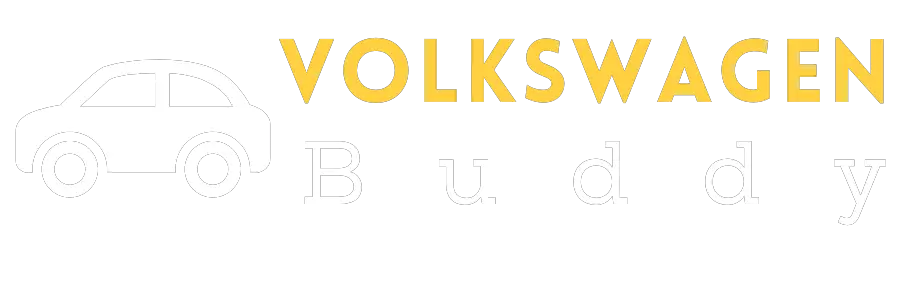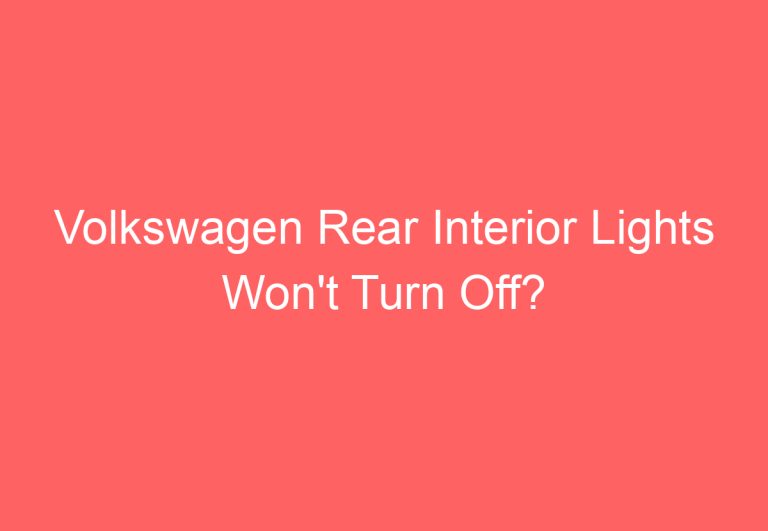Volkswagen Jetta Won’t Turn Off? Here’s Why!
As a Volkswagen technician, I’ve seen my fair share of Volkswagen Jettas that won’t turn off. This is a frustrating and inconvenient problem for owners, as it can prevent them from using their vehicle. It’s also important to diagnose and resolve the issue quickly, as it could potentially damage the vehicle.
This guide will walk you through the steps to troubleshoot a Volkswagen Jetta that won’t turn off. By following these steps, you should be able to identify and resolve the problem, restoring your vehicle to full functionality.
Purpose of this guide
The purpose of this guide is to help Volkswagen Jetta owners troubleshoot the issue of their vehicle not turning off. The guide will provide step-by-step instructions on how to identify and resolve the problem. By following these steps, you should be able to get your vehicle back on the road and running smoothly.
Steps to troubleshoot the issue
The following steps will help you troubleshoot the issue of your Volkswagen Jetta not turning off:
Why Volkswagen Jetta Wont Turn Off
Dead Battery
The most common reason for a Volkswagen Jetta not turning off is a dead battery. When the battery is dead, the car’s electrical system cannot function properly, and the engine will not start. To check if the battery is dead, use a voltmeter to measure the voltage at the battery terminals. If the voltage is below 12 volts, the battery is dead and needs to be replaced.
Faulty Ignition Switch
Another common cause of a Volkswagen Jetta not turning off is a faulty ignition switch. The ignition switch is responsible for sending power to the starter motor, which starts the engine. If the ignition switch is faulty, it may not be able to send power to the starter motor, and the engine will not start. To check if the ignition switch is faulty, use a multimeter to measure the voltage at the starter motor terminals. If there is no voltage at the starter motor terminals, the ignition switch is faulty and needs to be replaced.
Faulty Starter Motor
A faulty starter motor can also prevent a Volkswagen Jetta from turning off. The starter motor is responsible for turning the engine over, and if it is faulty, it may not be able to turn the engine over enough to start it. To check if the starter motor is faulty, try to start the engine. If the engine does not start, or if it starts and then immediately dies, the starter motor is faulty and needs to be replaced.
Faulty Engine Control Module ECM
The engine control module ECM is responsible for controlling the engine’s operation. If the ECM is faulty, it may not be able to properly control the engine, and the engine may not start or may not turn off. To check if the ECM is faulty, use a diagnostic scanner to read the ECM’s codes. If there are any codes, the ECM is faulty and needs to be replaced.
Other Causes
There are a few other possible causes of a Volkswagen Jetta not turning off, including:
A faulty fuel pump
A faulty fuel injector
A faulty throttle body
A faulty mass air flow sensor
A faulty crankshaft position sensor
A faulty camshaft position sensor
How to Troubleshoot: Volkswagen Jetta Won’t Turn Off
Your Volkswagen Jetta won’t turn off, and you’re not sure what to do. You’ve tried everything you can think of, but nothing seems to work. In this blog post, we’ll walk you through the steps of troubleshooting a Volkswagen Jetta that won’t turn off. We’ll cover everything from simple checks to more complex repairs. By the end of this post, you’ll have a good understanding of the problem and how to fix it.
Step 1: Check the battery
The first thing you should do is check the battery. A dead or dying battery can prevent your Jetta from starting or turning off. To check the battery, you’ll need a voltmeter. First, disconnect the negative battery cable from the battery. Then, connect the voltmeter to the positive and negative terminals of the battery. The reading should be between 12.6 and 12.8 volts. If the reading is lower than 12.6 volts, the battery is probably dead and needs to be replaced.
Step 2: Check the starter
If the battery is good, the next thing you should check is the starter. The starter is a small motor that turns the engine over when you turn the key in the ignition. To check the starter, you’ll need a test light. First, disconnect the negative battery cable from the battery. Then, connect the test light to the positive terminal of the battery. Finally, touch the other end of the test light to the starter solenoid. If the test light comes on, the starter is working properly. If the test light does not come on, the starter is probably bad and needs to be replaced.
Step 3: Check the ignition switch
If the battery and starter are good, the next thing you should check is the ignition switch. The ignition switch is a switch that connects the battery to the starter. To check the ignition switch, you’ll need a multimeter. First, disconnect the negative battery cable from the battery. Then, connect the multimeter to the positive and negative terminals of the ignition switch. The reading should be between 12.6 and 12.8 volts. If the reading is lower than 12.6 volts, the ignition switch is probably bad and needs to be replaced.
Step 4: Check the fuel pump
If the battery, starter, and ignition switch are good, the next thing you should check is the fuel pump. The fuel pump is a pump that pumps fuel from the fuel tank to the engine. To check the fuel pump, you’ll need a fuel pressure gauge. First, disconnect the negative battery cable from the battery. Then, connect the fuel pressure gauge to the fuel rail. The fuel pressure should be between 35 and 45 psi. If the fuel pressure is lower than 35 psi, the fuel pump is probably bad and needs to be replaced.
Step 5: Check the fuel injectors
If the battery, starter, ignition switch, and fuel pump are good, the next thing you should check is the fuel injectors. The fuel injectors are small valves that spray fuel into the engine. To check the fuel injectors, you’ll need a fuel injector cleaner. First, disconnect the negative battery cable from the battery. Then, spray the fuel injector cleaner into the fuel injectors. Finally, start the engine and let it run for a few minutes. If the engine runs smoothly, the fuel injectors are probably good. If the engine runs rough, the fuel injectors are probably bad and need to be replaced.
Step 6: Check the engine control module (ECM)
If the battery, starter, ignition switch, fuel pump, and fuel injectors are good, the next thing you should check is the engine control module (ECM). The ECM is a computer that controls the engine. To check the ECM, you’ll need a scan tool. A scan tool is a device that connects to the ECM and allows you to read the diagnostic trouble codes (DTCs). The DTCs will tell you what is wrong with the engine. If there are no DTCs, the ECM is probably good. If there are DTCs, the ECM is probably bad and needs to be replaced.
Conclusion
These are the steps you can take to troubleshoot a Volkswagen Jetta that won’t turn off. If you have followed these steps and the problem is still not fixed, you should take your Jetta to a qualified Volkswagen mechanic.
FAQs: Volkswagen Jetta Won’t Turn Off
Why won’t my Volkswagen Jetta turn off?
There are a few possible reasons why your Volkswagen Jetta won’t turn off. Here are some of the most common:
The ignition switch is stuck: This is the most common cause of a Volkswagen Jetta not turning off. The ignition switch is a small metal switch located in the center console of your car. It’s responsible for turning the engine on and off. If the ignition switch is stuck in the on position, it will prevent your car from turning off.
The battery is dead: If your battery is dead, it won’t have enough power to turn the engine off. This can happen if you leave your headlights on or if you have a parasitic drain on your battery.
The starter is stuck: The starter is a small electric motor that turns the engine over. If the starter is stuck, it won’t be able to turn the engine off. This can happen if the starter is damaged or if there’s a problem with the starter solenoid.
The engine is flooded: If your engine is flooded, it won’t be able to turn off. This can happen if you accidentally put too much gas in your car or if you try to start your car while it’s flooded.
How do I fix a Volkswagen Jetta that won’t turn off?
If your Volkswagen Jetta won’t turn off, you’ll need to troubleshoot the problem to find the cause. Here are some steps to help you troubleshoot the problem:
1. Check the ignition switch: The ignition switch is the most common cause of a Volkswagen Jetta not turning off. To check the ignition switch, turn the key to the off position and then try to start the car. If the car doesn’t start, the ignition switch is probably stuck. You can try to fix the ignition switch yourself or you can take your car to a mechanic.
2. Check the battery: If your battery is dead, it won’t have enough power to turn the engine off. To check the battery, use a voltmeter to check the voltage. If the voltage is below 12 volts, the battery is probably dead. You can replace the battery yourself or you can take your car to a mechanic.
3. Check the starter: The starter is a small electric motor that turns the engine over. If the starter is stuck, it won’t be able to turn the engine off. To check the starter, turn the key to the off position and then try to start the car. If the starter doesn’t turn over, the starter is probably stuck. You can try to fix the starter yourself or you can take your car to a mechanic.
4. Check the engine: If your engine is flooded, it won’t be able to turn off. To check the engine, turn the key to the off position and then try to start the car. If the car doesn’t start, the engine is probably flooded. You can try to fix the flooding yourself or you can take your car to a mechanic.
What are the safety risks of a Volkswagen Jetta that won’t turn off?
There are a few safety risks associated with a Volkswagen Jetta that won’t turn off. Here are some of the most common:
The car could stall while you’re driving: If your car stalls while you’re driving, it could be dangerous because you could lose control of the vehicle.
The car could catch fire: If your car is flooded, it could catch fire. This is a serious safety hazard because the fire could spread quickly and cause serious injuries or death.
The car could emit exhaust fumes: If your car is flooded, it could emit exhaust fumes. This is a health hazard because exhaust fumes can contain harmful chemicals.
What should I do if my Volkswagen Jetta won’t turn off?
If your Volkswagen Jetta won’t turn off, you should do the following:
1. Turn off the engine: If you can, try to turn off the engine by turning the key to the off position.
2. Get out of the car: Once the engine is off, get out of the car and stay away from it.
3. Call for help: Call a tow truck or a mechanic to come and fix the problem.
How can I prevent my Volkswagen Jetta from not turning off?
There are a few things you can do
Also Read: Volkswagen Lane Assist Turn Off



![Anything In My Volkswagen Worth Taking Off [Fix It For Good]](https://volkswagenbuddy.com/wp-content/uploads/2024/05/anything-in-my-volkswagen-worth-taking-off-fix-it-for-good_4540-768x531.jpg)
![Volkswagen Jetta Epc Light On And Off [Causes & Proven Solutions]](https://volkswagenbuddy.com/wp-content/uploads/2024/05/volkswagen-jetta-epc-light-on-and-off-causes-proven-solutions_4468-768x531.jpg)
![Volkswagen Engine Fault Codes [Answered]](https://volkswagenbuddy.com/wp-content/uploads/2024/05/volkswagen-engine-fault-codes-answered_4170-768x531.jpg)
